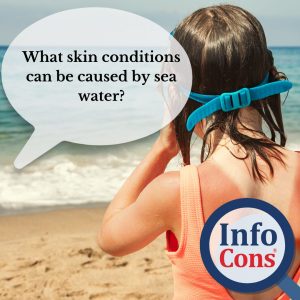Sea water is often associated with skin health benefits due to its mineral and trace element content. However, prolonged exposure to salty water can also cause certain skin conditions, especially in individuals with sensitivities or pre-existing conditions. Here are some common issues that sea water can cause:
Skin dryness
Mineral salts and other substances in sea water can draw moisture out of the skin, leading to pronounced dehydration. This is more likely to occur in hot and dry climates where water evaporation from the skin is rapid.
Skin irritation
Salt water can irritate sensitive skin or trigger allergic reactions in some individuals. These irritations may be accompanied by itching, redness, and in some cases, swelling.
Contact dermatitis
Chemicals and contaminants in sea water can cause contact dermatitis in people sensitive to these substances. This condition manifests as redness, inflammation, and may include blisters or peeling in affected areas.
Mechanical acne
Some individuals may develop mechanical acne due to prolonged exposure to sea water. This type of acne primarily results from constant friction of salt and sand against the skin, which can clog pores and cause inflammation.
Allergic reactions
Certain individuals may develop allergic reactions to specific marine organisms or to chemicals present in sea water, such as pesticides and other pollutants.
How to Protect Yourself
To prevent these skin conditions during exposure to sea water, consider the following precautions:
Proper hydration: Apply a protective moisturizing cream before and after exposure to sea water to keep the skin hydrated.
Sun protection: Use broad-spectrum sunscreen to protect your skin from UV radiation and other environmental agents.
Gentle washing: After swimming in the sea, rinse thoroughly with fresh water to remove salts and sand that could irritate the skin.
Protective clothing: Wear lightweight, loose-fitting clothing to reduce friction and irritation from sand or salt.
In conclusion, sea water can have both benefits and potential adverse effects on the skin. It’s important to be aware of these risks and take necessary measures to protect your skin health during seaside vacations or recreational activities in marine environments.
How to Determine if Sea Water is Contaminated
To determine if sea water is contaminated, there are several indicators and methods you can use:
Appearance and smell of the water:
Appearance: Contaminated sea water may have an unusual color or presence of excessive foam, visible residues, or oil slicks.
Smell: It may emit unpleasant odors like petroleum, waste, or other chemical substances.
Observation of marine flora and fauna:
Fishing and marine activities: If you notice dead fish, crustaceans, or other marine organisms in the area, the water may be contaminated.
Toxic algae: Presence of toxic algae or algal blooms can indicate water contamination.
Reporting to local authorities:
Alerts and reports: Local environmental or public health authorities can provide information about sea water conditions and potential contamination. Check their websites or public announcements.
Water quality monitoring:
Physico-chemical measurements: Responsible organizations conduct regular measurements of water quality to detect levels of chemicals, bacteria, heavy metals, and other contaminants.
Microbiological tests: Tests can be conducted to check for the presence of pathogenic bacteria such as Escherichia coli or enterococci, which indicate fecal contamination.
Local information and warnings:
Closed beaches or warnings: If beaches are closed or if there are public warnings about water quality, the water may be contaminated and pose a health risk.
In general, it’s important to be aware of your surroundings and follow local information to avoid exposure to contaminated sea water. If you observe signs of contamination or are concerned about water quality, it’s best to consult relevant authorities or completely avoid the affected area until the issue is resolved and the water is safe for use.
Precautionary Measures Before Contacting Sea Water
Before coming into contact with sea water, it’s important to take the following protective measures to avoid skin conditions and other issues:
Apply sunscreen protection:
Use broad-spectrum sunscreen: Choose a sunscreen with adequate SPF (preferably at least SPF 30) to protect your skin from UVB and UVA radiation.
Apply evenly: Cover all exposed areas of skin with sunscreen at least 15-30 minutes before sun exposure and reapply every two hours or after swimming.
Hydration and hair protection:
Apply hair protection oil: To protect your hair from the drying effects of salty water and the sun, use special hair oils before exposure to the sea.
Hydrate your skin: Apply a protective moisturizing cream to your skin before entering the water to reduce the drying effects caused by sea mineral salts.
Proper equipment:
Wear sunglasses: Protect your eyes from UV rays with sunglasses that provide adequate UV protection.
Protective clothing: Wear lightweight, loose-fitting clothing to protect your skin from excessive sun exposure and from rubbing with sand or sea minerals.
Remove jewelry and makeup:
Remove jewelry and makeup: Avoid wearing jewelry and makeup before entering the water to prevent irritation and damage from salts and salty water.
Check safety conditions:
Read local warnings: Check warnings and local information regarding sea water quality and beach safety conditions.
Avoid areas with toxic algae: Be aware of algae blooms and other natural phenomena that can affect water quality and your health.
By following these precautions before coming into contact with sea water, you can reduce the risk of developing skin conditions and safely enjoy your time in the marine environment. Make sure you are properly prepared to enjoy all the benefits offered by the ocean in a healthy and safe manner.
Source: Consumer Reports
